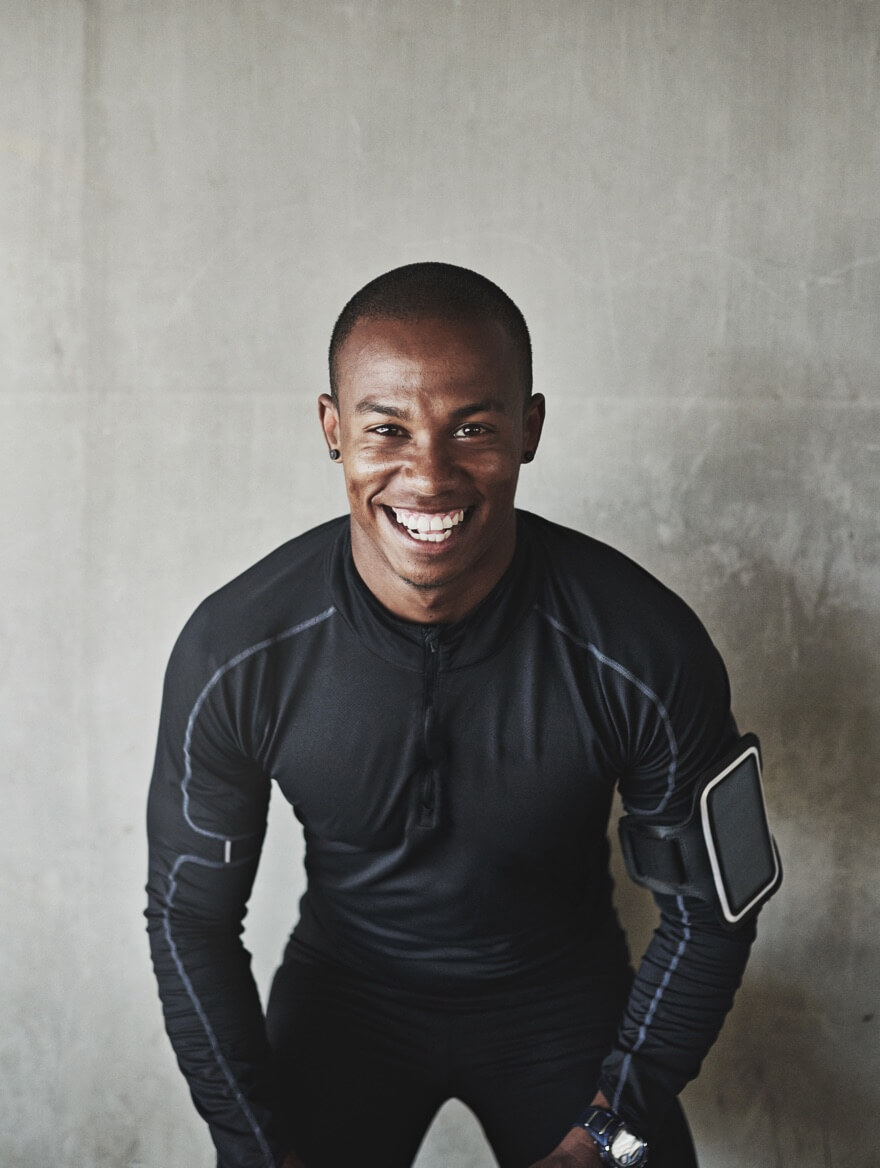Weakened Physical Function
Dr. Jeff Brault describes how to recognize and deal with your cancer-related weakened physical function. Download the audio file
Introduction

Cancer, along with treatments, can affect how your body works. You may notice your body struggles to perform as usual. Everyday activities may take longer and be harder to do.
Improving your physical function may help you to continue doing the things that you want and need to do. Better physical function also helps you to:
- Tolerate cancer treatments.
- Avoid being in the hospital.
- Live and do things independently.
Your weakened physical function, also called functional loss, may be caused by cancer, cancer treatments, or muscles that become small and weak over time. The best way to prevent functional loss caused by cancer and cancer treatments is to notice it early. Be sure to let your care team know immediately if a part of your body becomes weak. For instance, you may notice your arm or leg feels weaker. Also let your care team know if you have difficulty walking, getting out of a chair, or you struggle with your usual activities.
Low levels of hormones and low blood cell counts also can cause loss of function. Your care team may need to run tests or make changes to your treatment to manage these problems and improve your physical function.
Symptoms, especially pain, can also affect physical function. If you notice you are avoiding certain activities because of symptoms, let your health care provider know.
Keep a diary or log about your physical function (template available here). Include details about the following:
- Activities you struggle with.
- Symptoms you may have during activity, such as shortness of breath or stiff joints.
- Activities you feel confident about.
- How your physical function gets better or worse over time.
- Any falls or almost falls.
Be sure to share this information with your health care team.
There are many ways you can improve your physical function. You may have to try different activities. What may work for one type of functional loss may not work for another. And as your cancer treatments change, your physical function also may change. Staying active, however you are able, is most important. A little activity every day can go a long way. Learn more about daily activity here. The following are other ways to help your physical function.
Tools for monitoring
Cancer Symptom and Function Log
Keep a diary or log of your symptoms.
Medical therapies
There are no medications proven to improve physical function. However, certain medications can help you with symptoms and causes of functional loss. Pain medicines are an example.
Some medications, such as steroids, can help people feel more energetic and stronger. But when you use these medications over long periods, they can cause problems, such as bone thinning and ulcers. Because of this, it is important to weigh the pros and cons.
Your health care provider also may recommend nutritional supplements and vitamins. He or she also may prescribe medications to increase your appetite.
Tools for daily movement
My Road to Better Health: Move Daily
This piece explains how exercise can help you improve your physical and mental health. It also provides tips for getting started on an exercise plan and suggestions for sticking to your plan.
Behavior strategies
- Set realistic goals that are meaningful to you (learn more about setting goals here).
- Stay motivated. Negative thoughts can be discouraging. Cognitive behavioral therapy, also called CBT, can help you replace these thoughts with more constructive ones. More information about CBT is available here.
- Treat contributing symptoms, such as anxiety, depressed mood and fatigue. Left untreated, these symptoms can affect your physical function.
- Seek out physical activities that bring you joy.
- Reward yourself. After you finish an exercise or stick to an action plan, give yourself a reward. Maybe this is going to the movies or eating out at your favorite restaurant. Rewards also can help you stay motivated.
- Be aware that cancer treatments can reduce your energy for a time. Plan physical activity at times when you have more energy.
Tools for goal setting
Goal Setting Worksheet
This piece outlines steps for setting attainable goals to make changes in your life. It also explains why making changes based on what you value is important.
Physical activity
Activity and exercise are the best ways to improve your physical function. Unless you cannot walk, a good place to start is by using a pedometer, smart phone or other activity monitor to keep track of your steps. Set a weekly step goal and try to increase it every two to three weeks. Make sure that your new goal is realistic but still pushes you a little.
Each person’s fitness levels are different. For instance, you may struggle with balance and flexibility while still being able to walk for miles. If you know your fitness limits you’ll be able to select exercises that are most effective for you. There are exercises to improve balance, endurance, strength, and flexibility. And if you combine exercises to create a personalized program, it is the best way to improve your physical function. More information on starting an exercise program is available here. Information about strength training is available here.
Exercise and physical activity can protect you from complications and side effects of cancer treatment. These benefits include improvements in:
- Bone mineral density.
- Hormonal function.
- Ability to tolerate stress.
- Blood pressure.
Start with easy exercises to help prevent injury and to help you set realistic goals. Try the following to increase your program slowly:
- Add time to your exercise.
- Do your exercise a little faster.
- Select more challenging exercises.
Once you can do your program with confidence, you can improve more quickly. You do this by performing exercises in ways that push you slightly beyond your normal limits. This should not be hard or uncomfortable.
Interval training (described here) is one way. It helps to improve endurance through aerobic exercises performed intensely for shorter periods of time separated by planned rest. Physical therapists are experts who can help advance your exercise. They also can help create a program just for you. Talk to your health care team if you want physical therapy support.
Your enjoyment and motivation are key. Try not to compare your level of fitness now with what it was before you were diagnosed. Take it day by day and week by week. Log your progress so you can see how you improve. Pick activities that you have always enjoyed and are comfortable doing. For example, if you always liked to hike, walk on level surfaces or use walking poles to help with balance. It may take time and will power, but it is usually possible to get back to your level of fitness before your diagnosis.
Talk to your oncology care team before you start to exercise if you have any of the following:
- A recent fall or almost fall.
- Blood platelet counts below 15,000.
- Tubes, drains or open wounds.
- Diseases that affect your bones.
- Lymph nodes removed under your arm or in your groin or pelvis.
Tools for exercise
Exercise: Getting Started and Staying with It
This piece explains why exercise is important and the various benefits of exercising. It also explains the importance of setting short and long-term goals, gives examples of types of exercise that might work for you and outlines things you can do to stick to your exercise plan.
Integrative therapies
- Alternative exercises, such as Tai Chi and yoga can help to increase strength, balance and flexibility. They may also reduce stress.
- Mindfulness practices can improve function by reducing anxiety and improving quality sleep.
Diet
Diets have not been shown to improve physical function. However, getting enough protein and other nutrients for muscles and nerves can protect you from functional loss.
- Eat a balanced diet that includes proteins that are also low in saturated fat. They include lean meat, fish, skinless poultry, eggs, nuts and seeds, and low-fat dairy products such as milk, yogurt, and cottage cheese. Eating enough protein is critical to prevent muscle loss.
- Avoid foods and drinks that are high in fat and sugar content.
- Drink plenty of water every day to stay hydrated.
Note: If you are trying to gain weight, talk to your oncology team about a diet for you.
What friends and family can do
Family members and friends can help support you when they:
- Become your exercise partner or coach. Walking and exercising with you can help you stay active. Your loved ones can set their own fitness goals.
- Lighten your load. For instance, help you to prepare meals and do other household chores. Their help may free you up to exercise.
- Give you rides to places where you can walk.
- Take you back and forth to classes and community programs.
- Give you encouragement and gently remind you of your goals.
- Help you to stick to your schedule or Action Plan (template available here).
Tools to help set goals
Cancer Symptom and Function Log
This piece explains why it is important to keep track of your symptoms and includes a log for you to record your symptoms and what helps them or makes them worse.
What if I want more help?
There are health care specialists who can help you manage your weakened physical function, such as the following:
- Dietician. A dietician can develop a high protein diet just for you.
- Athletic trainer or exercise physiologist. These specialists can create an exercise plan for you.
- Physical therapist. Physical therapy (PT) can help you return to your fitness goals. This may be especially helpful after surgery or if one part of your body has been affected by cancer or cancer treatments. He or she also can help your balance and ability to move safely and independently.
- Occupational therapist. Occupational therapy (OT) may be able to teach you how to do everyday tasks in less pain. OT also uses special equipment to make your tasks easier so you can save your energy.
- Physical medicine and rehabilitation (PMR) physician. Physicians specialized in PMR can help you develop an exercise program when you have intense symptoms, other medical problems, or cancer in your bones or nerves.
Talk with your care team about helpful resources available in your community.
There also are self-directed materials with more information to help you manage weakened physical function. You can get these materials by:
- Going online at cancereducation.mayoclinic.org
- Asking your care team.
